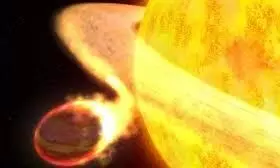
One in 12 stars can eat a planet, finds new study
text_fieldsApproximately one out of every twelve stars in the universe could have the capacity to consume a planet, unveiled a new study.
Scientists have long speculated about the possibility of stars devouring planets, based on the detection of unusual element compositions in certain stars.
This new research, reported by Space.com, bolsters this theory by focusing on "co-natal" stars, which are twin stars born from the same cloud of gas and dust. Any significant differences in their chemical makeup could indicate events like a star engulfing a planet.
By utilizing data from the European Space Agency's Gaia satellite, the research team identified 91 pairs of co-natal stars. Through meticulous analysis of the stars' light using advanced telescopes, they scrutinized their elemental compositions.
The findings were striking. In approximately 8% of the pairs, one star exhibited signs of planetary ingestion, showcasing a distinct chemical composition compared to its twin.
Study co-author Yuan-Sen Ting, an astronomer at the Australian National University in Canberra, expressed surprise at the frequency of these occurrences, noting, "It implies that stable planetary systems like our own solar system might not be the norm. This gives us a deeper perspective on our place in the universe."
While it's anticipated that our Sun will consume some planets as it transitions into a red giant in the distant future, the study primarily focused on stars in their prime.
This suggests that planetary consumption might be more commonplace during a star system's typical lifespan. One hypothesis is that rogue planets, expelled from their own systems, could collide with other stars.
The implications of these findings suggest that many planetary systems may be less stable than previously assumed, potentially resulting in planets being ejected randomly. However, the researchers reassure that our solar system appears stable for the foreseeable future, alleviating immediate concerns.
Published in the journal Nature, the study leaves some questions unanswered, particularly regarding whether stars are swallowing fully formed planets or remnants of planetary building blocks.























